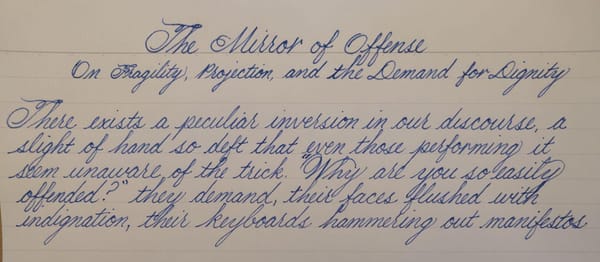The Inconvenient Truth About 'Erasing History and Parental Experiences'
Let's Talk About Birth Certificates and Transgender Rights

Hey folks, I want to talk to you today about a recent article I read on pittparents.com. It was called "Erasing History and Parental Experiences for Feelings and Wishes,"1 and it was written by a parent who's struggling with their adult child's transition.
Now, I want to start by saying that I feel for this parent. I really do. Having your kid come out as transgender can be a real shock to the system, and it's natural to feel a sense of loss and confusion. Those feelings are valid, and they deserve to be heard with compassion.
But here's the thing - the central argument of this piece, the idea that allowing transgender people to update their birth certificates is some kind of dangerous "erasure of truth"? Well, I'm sorry to say, but that just is not right.
See, birth certificates aren't some kind of sacred historical record. They're not a biography of your whole life story. They are legal documents, nothing more, nothing less. And the whole point of a legal document is that it needs to be accurate and up-to-date. Birth certificates are an identity document, like a driver’s license or passport. You update those on a regular basis too. The thing is, birth certificates rarely need to be updated, but sometimes they do.
Plenty of cisgender folks update their birth certificates all the time and for all kinds of reasons. Maybe they got adopted, or found out that one of their parents is not really their parent; and in the rare case, maybe they discovered a clerical error when the original record was made. Maybe they went through a court process to change their name for personal or professional reasons, and want that reflected on their birth certificate. The point is, it's a routine process, not some kind of conspiracy to rewrite history.
But for transgender people, having accurate identity documents isn't just a matter of paperwork. It's a matter of safety and survival. Every time a transgender person has to show an ID that doesn't match who they are, they're putting themselves at risk of discrimination, harassment, even violence.
And that's not just me talking - there's studies that show how not having accurate documents makes it harder for transgender folks to get jobs, housing, healthcare, all the basic stuff we all need to live.
So when this parent says they want to prevent their adult child from updating their birth certificate? I have to ask - how is that an act of love? How is that supporting your kid's well being and autonomy? Who is putting what first by wanting to deny that?
And to anyone reading this who might be nodding along with the original article, I want you to what it would be like if your birth certificate said you were the wrong sex, just because of some clerical error when it was entered into the system. Say, as a woman, every legal document you have says “M”. So everywhere you go, be it your doctor or when you get carded for wine purchases, everyone sees “M” under your sex. Your driver’s license/ID card, your medical record, it is a part of your public data. They read see this, and when they look at you, they assume you are a trans woman. Wouldn't you want to be able to fix that? I sure would! So why should it be any different for transgender people?
The author of this piece, “EyesOpen”, talks about their son's transition like it's erasing their family history, like it's negating all their memories and experiences as a parent. But I feel compelled to ask - is your relationship with your child really so fragile that it can't handle them being their true self? What if, instead of seeing this as a loss, you saw it as a chance to know your kid on a deeper level, to bond in a way that was never possible before?
I ask myself this: Does it remove me as a parent, or deny that I gave birth to them? No? Then it is not erasing me from my kid’s parental history. I do not have a claim to my child's sex/gender, and neither do you. Unless you believe that my parents, or yours, can decide that, due to some odd chromosome they just now discovered, they want you to change your documents to read “Male” instead? I don’t think I would be willing to do that, because that is simply not who I am.
And just as I wouldn't accept my parents dictating the sex marker on my birth certificate for any reason, we shouldn't accept anyone dictating or denying this right for transgender people either.
At the end of the day, the truth that matters is not what the doctor put on a birth certificate twenty, thirty, forty years ago. It's the truth of who a person is, right here and now. And part of living in a free society is respecting each person's right to determine that truth for themselves. If preserving the historical record is that important to you, then I am sure you have a copy of their birth certificate shortly after they were born. Go frame that and hang it on your bedroom wall. Ask you son for the copy of his legal paperwork to request the updated birth certificate, as it will show the “before” and the requested “after” and frame that too. If that is not enough, then I question if this is really about “preserving the historical record/truth” and is really more about what you are making this about: yourself.
Transgender people aren't trying to erase history or deny reality. They're just trying to live their lives with dignity and authenticity, and that means with the reality of their life and self that is often viewed as a contradiction in many other’s perspectives. And as parents, as fellow human beings, I believe we have a duty to be sensitive to that reality, and to support and respect that.
So to the author of this article, and to anyone else struggling with a loved one's transition - I see you. I know it's not easy. But I'm asking you to open your heart, to educate yourself, and to trust that loving your child for who they are will only make your bond stronger.
There's some great resources out there for families navigating this stuff - PFLAG, the Family Acceptance Project, and others that I'll link down below in the footnotes2. But the most important thing is to keep showing up, keep listening, and keep leading with love. And to remind yourself: This is not about you.
Because at the end of the day, that's what family is all about. Not genetics, not paperwork, but unconditional love and acceptance. And that's a truth that no document can ever change.
As always, thanks for reading, thanks for keeping an open mind, and thanks for being part of the conversation. 'Til next time, take care of yourself, and take care of each other.
Original Article by EyesOpen: Erasing History and Parental Experiences for Feelings and Wishes: Do Birth Certificate Facts and Truth Still Matter? ↩
The links as promised:
PFLAG (https://pflag.org/) - PFLAG is the nation's largest family and ally organization for LGBTQ+ people. They provide support, education, and advocacy for families, friends, and allies of LGBTQ+ individuals.Family Acceptance Project (https://familyproject.sfsu.edu/) - The Family Acceptance Project is a research, intervention, education, and policy initiative that works to prevent health and mental health risks for LGBTQ+ children and youth by helping families learn to support and accept their LGBTQ+ children.
Gender Spectrum (https://genderspectrum.org/) - Gender Spectrum works to create gender-sensitive and inclusive environments for all children and teens by providing online programs, resources, and information to help families, schools, and organizations understand and support gender-diverse youth.
Trans Lifeline (https://translifeline.org/) - Trans Lifeline is a national trans-led organization that provides a crisis hotline and microgrants for transgender people in need. Their hotline is staffed exclusively by transgender operators, and they offer emotional and financial support to trans individuals and their families.
Trans Families (https://transfamilies.org/) - Trans Families is a national support group for families of transgender and gender-diverse children, teens, and adults. They offer online support groups, resources, and connections to help families understand and support their transgender loved ones. ↩


